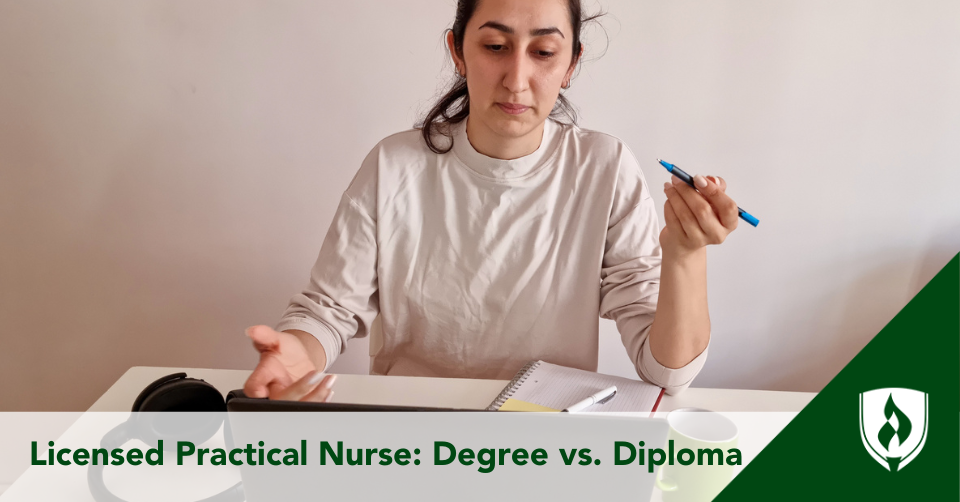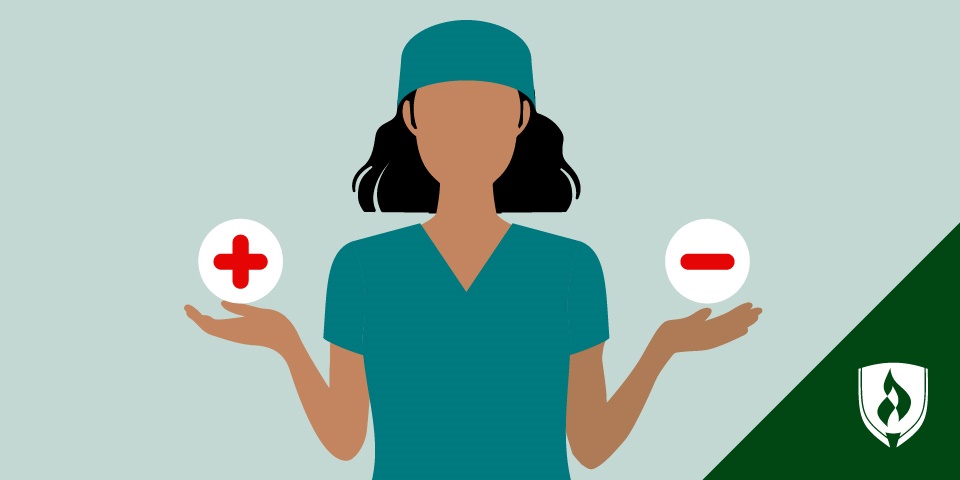Practical Nursing (LPN) Programs: Will I Earn a Diploma or a Degree?
By Hope Rothenberg on 09/07/2023

At first glance, it seems like getting started in the nursing field would be pretty straightforward. Find a practical nursing program, enroll, get a nursing degree and become a nurse, right?
While those steps are generally on the right track, there’s a little more you’ll need to get sorted out before taking the first step toward becoming a nurse.
There are many different types of nursing careers, and different levels of nursing education to go along with them. Case in point—what’s the difference between a degree vs. diploma?
And why are practical nursing programs connected to diplomas while other nursing programs (Associate’s, Bachelor’s) connected to degrees?
If you’re considering becoming a licensed practical nurse (LPN) and wondering about the difference between a degree versus a diploma, read on!
Degree vs. diploma: what’s the difference?
Degrees and diplomas exist in many fields (not just nursing). In general, a degree represents a higher level and longer duration of study than a diploma. Degree programs involve holistic study of a topic (practical skills and a broad knowledge base) where diploma programs typically cover the hands-on or technical elements of something.1
For example, a nursing degree program includes coursework in nursing leadership and nursing specialty areas like gerontology and mental health—along with training in technical skills (like how to monitor vital signs or insert an IV).
Nursing degree programs can come at many different levels. An associate’s or bachelor’s degree in nursing will prepare you to become a registered nurse (RN). Higher degree options might prepare you to become a nurse practitioner, a nurse educator or a specialist in many different areas of nursing.
Practical nursing (LPN) diploma programs involve hands-on skill training to prepare students for specific tasks in their field. For nurses, a diploma program is called a practical nursing program. Practical nursing programs prepare nursing students to become licensed practical nurses (LPNs).
Practical nursing diploma vs. associate’s degree in nursing: What’s the difference?
So if a nursing diploma is meant to prepare you for work as an LPN and a nursing degree is meant to prepare you to work as an RN, what is the difference between those two nursing roles?
Differences in job duties: LPN vs. RN
Licensed practical nurses—called licensed vocational nurses (LVN) if you live in Texas or California—have a smaller scope of practice than RNs. They often work under the supervision of a registered nurse as well.
LPN job duties revolve around more basic nursing care, and typically include helping patients with basic tasks of daily life like bathing and dressing, as well administering medications, aiding in wound care and monitoring patient vital signs for changes in status.
LPNs may also oversee certified nursing assistants (depending on state requirements) though they don't hold management positions, as the primary LPN duties revolve around patient care.
Registered nurses also provide direct patient care, but they are responsible for a wider range of job duties. RNs develop patient treatment plans, administer medications (including intravenous medications), consult with physicians and educate patients about a diagnosis.
Differences in qualifications: LPN vs. RN
To start a career as an LPN, you’ll need to earn a practical nursing diploma, pass the National Council Licensure Examination for Practical Nurses (NCLEX-PN®) and meet all other state licensure requirements.
To work as a registered nurse, you have the option to pursue either an associate’s degree in nursing (ADN) or a bachelor of science in nursing (BSN). Once successfully completed, would-be RNs will need to pass the National Council Licensure Examination for Registered Nurses (NCLEX-RN®) and meet all other state licensure requirements.
Both nursing degree and nursing diploma programs will offer the courses you need to feel confident in working with patient populations in a range of healthcare settings.
Whichever education path you choose when it comes to RN vs. LPN, you can expect to graduate with a solid foundation in patient-centered nursing and practical skills in line with the scope of practice for whichever nursing role you’re pursuing.
Differences in job settings: LPN vs. RN
Another major difference between LPNs and RNs jobs is the types of facilities they work at. Licensed practical and licensed vocational nurses held about 657,200 jobs in 2021, according to the U.S. Bureau of Labor (BLS). Their largest employers were nursing and residential care facilities, making up 35% of LPN jobs. 15% were employed in state, local and private hospitals, 14% in home healthcare services and 12% in physicians offices.2
On the other hand, registered nurses held about 3.1 million jobs in 2021. The vast majority—60%—were located in state, local and private hospitals. 18% were employed in ambulatory healthcare services and just 6% in nursing and residential care facilities, according to the BLS.2
Though both program options will help put you on track to begin a nursing career—either in a hospital setting or in a nursing or residential care facility—choosing the option that’s right for you will depend on your career goals.
LPN diploma: Pros and cons
Pros
Shorter time to completion
If your goal is to get started as soon as possible, an LPN diploma is your best bet. You can earn an LPN diploma in as few as 12 months, then sit for the NCLEX-PN exam to become licensed.3
Lower cost
It’s no surprise that a shorter education program is also typically the more affordable option. If you’re looking to get into the nursing field for less expense, the LPN route may be an appealing option.
Positive job outlook
Thanks to the aging baby boomer generation, LPN employment is growing steadily. Employment of licensed practical and licensed vocational nurses is projected to grow 6 percent from 2021 to 2031, which is about as fast as the average for all occupations, according to the BLS.2
About 58,800 openings for licensed practical and licensed vocational nurses are projected each year, on average, over the decade. Many of those openings are expected to result from the need to replace workers who transfer to different occupations or exit the labor force to retire.2
Simple path to become an RN later
If you want to start your nursing career with a practical nursing (LPN) program (while making sure you still have advancement opportunities down the road) you'll have simple options for doing just that.
LPNs can always enroll in the Rasmussen University professional nursing program, which offers a bridge path from LPN to RN that can be completed in as few as 12 months.3 By pursuing both ADN and practical nursing programs, you’ll be able to build on your existing knowledge rather than start from scratch.
Cons
Less autonomy on the job
Although a practical nursing diploma (LPN) could be completed faster than a professional nursing (RN) program, LPNs don’t have quite as much independence in working with patients as RNs do. LPNs typically need to be supervised by an RN or physician, though the exact regulations vary by state.
RN associate’s degree in nursing: Pros and cons
Pros
More credits toward a bachelor’s degree
If a bachelor’s degree is on your radar for the future, an associate’s degree will help you achieve more credits that may count toward a BSN later on. For example Rasmussen University’s RN to BSN program allows students to transfer up to 134 credits.
Skills training for a broader scope of practice
The extra time it takes to earn an associate’s degree comes with a bit more specialized training than the broad nursing skills you’ll learn with an LPN diploma. Students enrolled in the Rasmussen University professional nursing associate’s degree (ADN) program for RN education may take courses like Multidimensional Care and Mental and Behavioral Health Nursing.
Positive career outlook
Similarly to LPNs, employment of registered nurses is projected to grow 6 percent from 2021 to 2031, which is about as fast as the average for all occupations. An average of 203,200 openings for registered nurses are projected each year over the decade, and many of those openings are expected to result from the need to replace workers who transfer to different occupations or exit the labor force to retire, according to the BLS.2
Cons
Longer time to completion
Earning an ADN and pursing RN licensing takes a bit longer than a practical nursing diploma. It’s common for programs to take up to two to three years, although Rasmussen University’s ADN program is designed to allow students to graduate in as few as 21 months.3
Greater cost
As you might expect, a longer degree program comes with a larger financial commitment. Though RNs are typically positioned to earn a higher salary than LPNs, the difference in upfront cost may be a downside for students who want to enter the workforce without making a large early investment.
Choose the road to begin your nursing career
In the debate of a nursing degree versus a diploma (LPN vs RN), there are pros and cons to weigh on both sides. If you know that becoming a licensed practical nurse is right for you, a practical nursing (LPN) diploma can help you get started quickly and affordably. An associate’s degree through an accredited nursing program, on the other hand, is best suited for those who want to enter the field as a registered nurse.
Either education path could allow you to begin your career as a nurse. Learn more about getting started by signing up for a Rasmussen University Nursing Information Session.
Related Articles:
NCLEX-RN® is a registered trademark of National Council of State Boards of Nursing, Inc.
NCLEX-PN® is a registered trademark of National Council of State Boards of Nursing, Inc.
1EDUAdvisor, Diploma vs Degree: What’s the Difference? (2022) [accessed August 2023] https://eduadvisor.my/articles/diploma-vs-degree-whats-the-difference
2Bureau of Labor Statistics, U.S. Department of Labor, Occupational Outlook Handbook, [accessed August 2023] www.bls.gov/ooh/. Information represents national, averaged data for the occupations listed and includes workers at all levels of education and experience. Employment conditions in your area may vary.
3Completion time is dependent on transfer credits accepted and the number of courses completed each term.
EDITOR’S NOTE: This article was originally published in 2021. It has since been updated to include information relevant to 2023.




